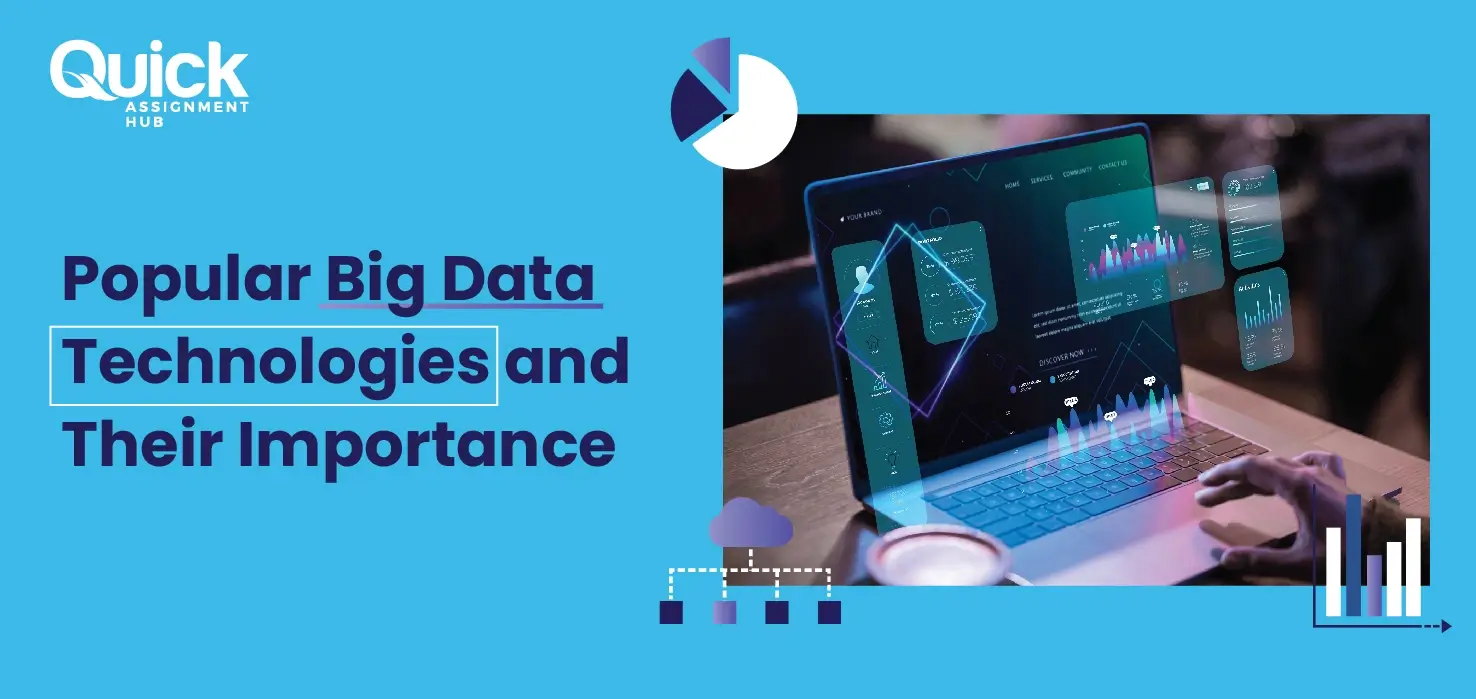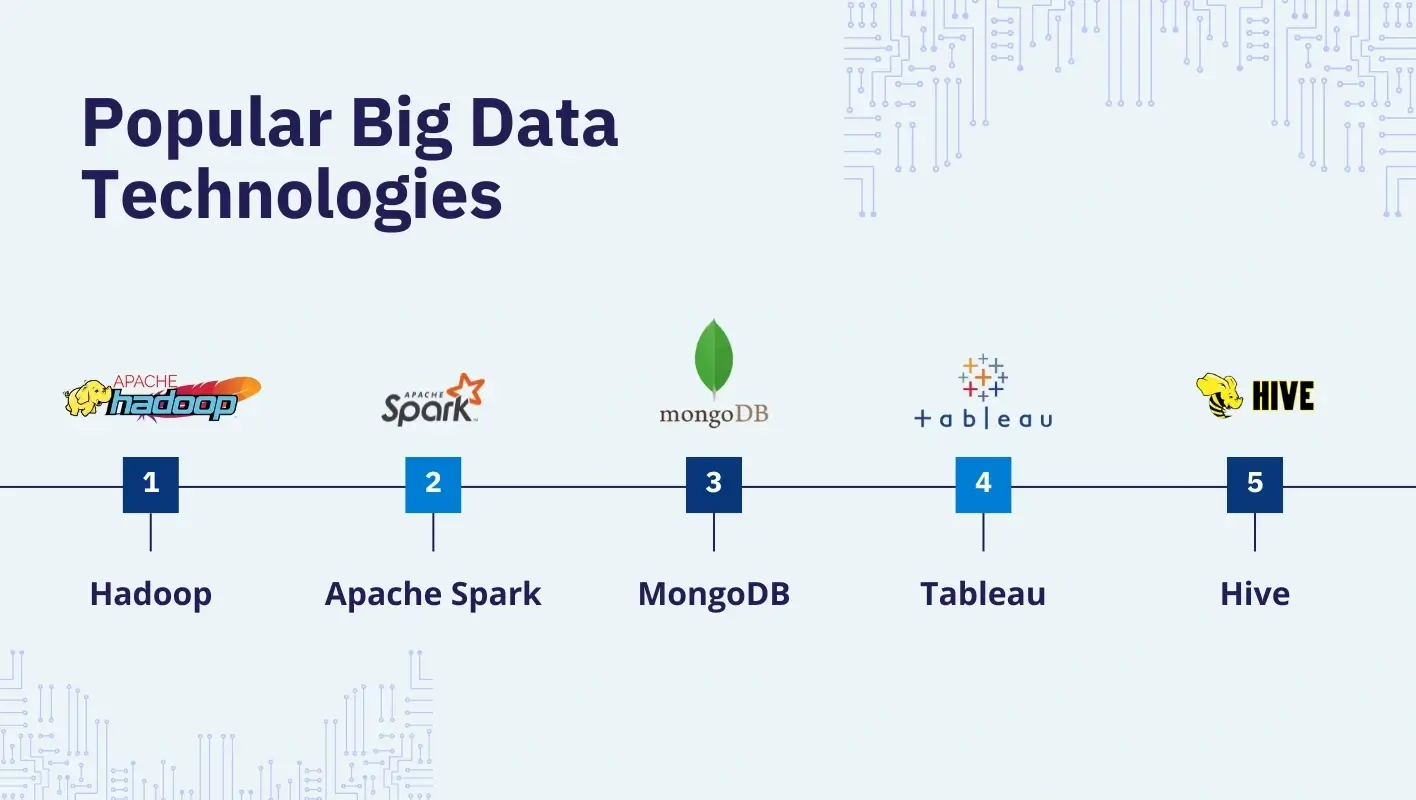
Today's world, with its focus on speed and availability of information, is characterised by every click, every transaction, and every interaction producing something in the order of a tsunami of information. The proactive leveraging of such data has emerged as a competitive advantage across industries worldwide. This, however, is where big data comes into play, altering how organisations can use information to make better decisions.
What big data is and how different big data technologies have a significant role in what they do and their customer's behaviour is essential for businesses to grow. This blog gives insights into big data, why it matters, and what tools and techniques define it.
This trend has spurred the emergence of a wide range of big data technologies that enable organisations to gather and analyse large volumes of data. Below are some of the leading tools in this domain:

Hadoop is an Apache Project software for distributed storage and computation of extensive data from gigabytes to petabytes. The distributed computing architecture lets data be processed across multiple cluster nodes, giving this model unprecedented speed and efficiency. The need for data warehousing also comes from the fact that Hadoop can work with structured, semi-structured, and unstructured data. It comprises the main parts: the Hadoop Distributed Computational Suite (HDCS), which includes HDFS for storage, Map Reduce for processing and YARN for resource management. This flexibility and scalability make Hadoop a foundational technology in big data environments.
Apache Spark is the brightest example of a cluster-computing framework designed for fast and in-memory primitive operations and real-time data processing capabilities for streaming applications. Unlike MapReduce, where the intermediate results are written on disk, Spark keeps data in memory to make more operations on it. It makes it perfect for applications that are iterative and common to machine learning. Spark can also work with Hadoop, utilising HDFS to store data, but combined with improved performance.
MongoDB is a demonstrated NoSQL data repository planned for bearer information. Introducing flexibility in defining the schema that results in more effortless data loading and data handling of various large data types. This kind of database technology is most appropriate for social networking, e-commerce, and IoT, as these areas have high churning dynamics of data structures. MongoDB's horizontal scalability across multiple servers is an effective way to have high availability and performance status.
Tableau is a BI tool that extracts raw data and presents it graphically using charts, graphs, and widgets. It allows users to dissect comprehensive data, package them in easy-to-understand visual forms, and make decisions quickly. Due to the friendly UI, it does not require the intervention of IT professionals for most reports and dashboards, making BI easily accessible to all fields of business.
Hive is a data warehousing tool built on top of Hadoop and provides support for querying massive datasets using an SQSQL-like language called HiveQL. Due to this abstraction, users conversant with SQL can efficiently work with big data without necessarily mastering the workings of Hadoop. Hive is more beneficial in large-scale operations and is well-suited for operational batch processing.
Through these technologies, organisations can solve various data challenges and advance Various operational challenges, improving their market competition. Both tools provide features that distinguish them as components of contemporary data solutions tailored for extensive data management and analysis.
The importance of big data lies in its ability to bring value across industries:
Predictive analysis, where data from the past is used to predict the future, is only made possible by big data. This capability is essential so that organisations can evaluate potential opportunities that can be ventured into and the risks that are likely to be faced by that organisation.
The studies can predict that applying Big Data algorithms, particularly machine learning, gives a higher accuracy when predicting the results. This is mainly seen in areas like the supply chain, for which accurate forecasts can help avoid overstocking and stock-out situations.
Example: Today's largest retail chains, such as Walmart, utilise big data to study buyers' behaviour and calculate the increased sales during the holiday season and the necessary product stock.
It is another way through which big data enables business organisations to provide customer value since they learn the customers' characteristics. This helps to build loyalty as well as to increase satisfaction.
Customer relationship management research also discusses using big data for segmenting and personalising. Social media, transactions, and customer feedback information are usually combined to form highly individualised experiences.
Example: Modern services like Netflix utilise big data analysis of users' history and preferences to retain customers' interest in their content.
It also has to do with the fact that one of the greatest strengths of big data is the ability to make improvements where it is needed most: at the operational level. Businesses may efficiently understand where dysfunctions are bound to occur and prevent them from undermining workflow.
Studying operation management, it is clear that big data and predictive maintenance can drop considerable downtime in industries, including manufacturing and aviation. Another advantage is that with information collected by sensors and logs from the equipment, it is possible to forecast failures before they appear.
Example: GE, for instance, applies big data analytics to analyse patterns and predict when jet engines will require maintenance, thus cutting on the cost of general maintenance while still considering safety.
Access to real-time market insights gives businesses a competitive edge. Big data allows organisations to identify emerging trends, understand competitors, and develop strategies accordingly.
In strategic management, big data is often cited as a critical driver of innovation. Companies leveraging big data to understand market dynamics are better equipped to adapt and succeed.
Example: Amazon uses big data to track competitors' pricing strategies, ensuring they remain competitive in real time.
It is as helpful in enhancing the healthcare industry as in emulating credit card scams.
Also read: How Can Students Become Masters in Adobe InDesign Assignment?
Risk data aggregation and analytics form a crucial process by which big data transforms massive information into valuable data. The analysis uses complex tools, specifically unique computer algorithms that reveal patterns, trends, and relations.
1. It enables better decision-making since managers can make decisions based on real-time information.
2. Improved operational efficiency results and reduction of costs.
3. Individual approach to clients.
4. Perceived benefits include improved risk management and decreased incidence of fraud.
For instance, Netflix applies big data to suggest programs and movies for audiences, and Amazon uses big data to improve its supply chain. Extensive data analysis plays an unprecedented role in the current environment where firms struggle for market supremacy.
While the benefits of big data are immense, there are also notable challenges:
1. Data Privacy and Security: Securing information that is either confidential or can be maliciously used from unauthorised access and use.
2. Integration Issues: Compiling data across sources and types of media.
3. Scalability: This is mainly due to the need to appropriately manage growing volumes of data.
4. Skill Gaps: They also noted the need for more quantity and quality human capital, specialising in big data technology.
The above challenges must be solved to fully allow organisations to harness the potential of widely used big data solutions.
Learn more about: A Beginner's Guide To Write SPSS Assignment
There shouldn't be any doubt that the demand for prominent data specialists is rising steeply. Employers need personnel with job titles such as Data Scientist, Big Data Engineer, and Business Analyst. Business enterprises in different parts of the world provide funds for people with expertise in big data technologies and help formulate business strategies. It enables students to find good-paying jobs in various sectors such as information technology, finance, health care, retail, etc.
Students can grab these high-paying jobs when they excel in their Big Data subjects. Quick Assignment Hub can help them by diligently completing assignments and courses within the deadline. Our experts ensure to curate research significant data assignments that help you score high in your semester exams. We understand that having a successful academic career enables you to land exciting opportunities.
For students struggling with considerable extensive data coursework, Quick Assignment Hub offers the perfect solution:
Affordable Pricing: Receive excellent coursework help at low prices.
Zero Plagiarism: Unique written material is primarily or exclusively produced by our expert writers based on the Customer's requirements.
Easy Refund Policy: Our customers are the kings, so their satisfaction is a top priority.
Expert Assistance: Assignments and coursework are completed by our academic experts, who are aware of state-of-the-art big data technologies.
If you want to find information on what big data is used for or if you want to read through the various issues related to big data, Quick Assignment Hub will guarantee your academic achievement.
Big data is now a reality and cannot be ignored, especially in terms of impacting and transforming industries and citizens. This paper shows how businesses can harness the potential of big data and use the top big data applications to enable growth and innovation and improve efficiency.
Ideally, placements are available for any student who wants to make a career in this field, and there is no better time to get in. Take advantage of this opportunity; utilise the right resources that Quick Assignment Hub provides, ace your significant data assignments, learn all about big data, and advance in your career.